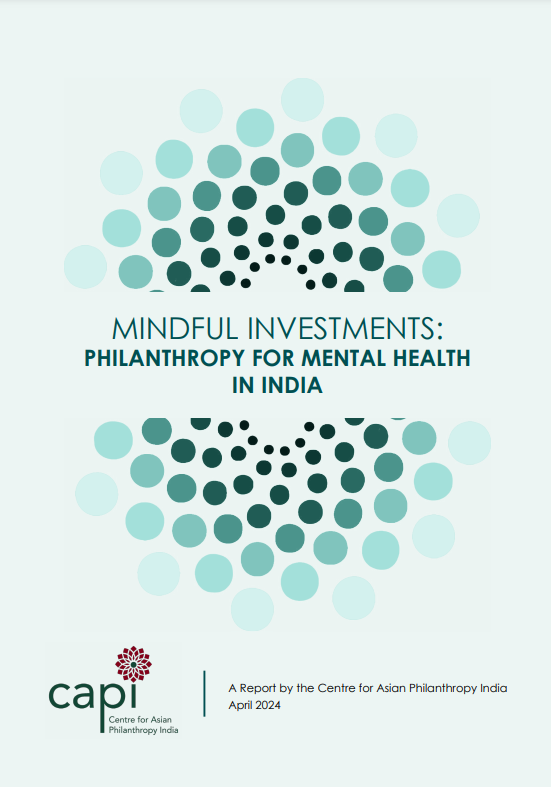How can philanthropy play a role in addressing India’s mental health needs?
Source – “Mindful Investments: Philanthropy for Mental Health in India
A new report by the Centre for Asian Philanthropy India (CAPI), titled “Mindful Investments: Philanthropy for Mental Health in India,” examines how Indian donors are addressing mental health challenges. The report highlights effective funding strategies and explores the reasons why some donors hesitate to give more. It then provides recommendations and opportunities to help donors better support India’s mental health needs.
India faces a significant mental health challenge, with an estimated one in seven people affected. This crisis has a major economic impact, costing an estimated US$1.03 trillion between 2012 and 2030. It also hinders progress on India’s development goals. Because of the scale of the problem, government funding isn’t enough. Philanthropists and private businesses are crucial partners in closing the funding gap and supporting mental healthcare initiatives.
Philanthropy for mental health: A Dynamic Terrain
Mental health has traditionally been overshadowed by other pressing issues in India. However, the past decade has seen a welcome rise in mental health philanthropy. The collective stress of COVID-19, lockdowns, and economic hardship further amplified the need for support. This study identifies three key funding approaches currently adopted by Indian donors for mental health initiatives.
- Institutional Approach – This approach supports facilities like hospitals, clinics, and counseling centers, along with helplines offering phone, WhatsApp, and online chat support. It prioritizes treatment by medical professionals at specialized care centers.
- Community Approach – This less common approach delivers mental health programs in local settings like primary healthcare centers, utilizing lay counselors from the community. Often integrated with social programs, it connects people to government support schemes.
- Funding Research and Science – Donors fund research projects at institutions like the National Institute of Mental Health and Neurosciences. These studies focus on collecting data specific to the Indian population, providing valuable insights into the local context.
Challenges to Giving
- Stigma: The shame associated with mental illness discourages potential donors from supporting the cause.
- Lack of Information: Donors struggle to make informed decisions due to limited data, case studies, and evidence on impactful mental health initiatives.
- Limited Capacity: The restricted number of nonprofits and mental health professionals makes it difficult for donors to find projects that align with their vision.
- Intangible Outcomes: Measuring the success of mental health programs can be challenging as results are often subjective and not easily quantifiable.
Recommendations
The vast number of people affected by mental illness highlights the limitations of relying solely on clinical interventions. We need a fundamental shift: understanding mental health not just as a medical problem, but as a wider developmental issue. This research identifies key opportunities for philanthropy to make a strategic impact.
- A significant opportunity lies in donors becoming vocal advocates for mental health. Openly supporting the cause and sharing experiences can significantly reduce stigma. Furthermore, funding educational programs, seminars, and advocacy campaigns can further raise public awareness and understanding. Collaboration among donors can establish regional Centers of Excellence that pool knowledge and best practices, driving the future of mental health care in India.
- Philanthropy can make a big impact by supporting neglected areas. Funding programs focused on prevention, rehabilitation, and education offers high returns. This could include materials on self-care, anti-stigma campaigns, training volunteers, and early intervention programs. Community-based mental health models, which deliver care directly in villages, are another promising low-cost option for donors.
- Donors can go beyond traditional support. Funding innovative strategies like “managed care” insurance models can improve access to care. Seed capital competitions can spark new ideas and technologies. Additionally, donors can invest in talent development through workshops and training programs, not just for medical professionals, but also for educators, community workers, and even journalists – creating a more informed and supportive network.
- Donors can support and foster cross-sectoral partnerships that involve joint initiatives, shared resources, and expertise exchanges to leverage the strengths of all sectors. Such collaborations can help promote shared research efforts to better understand mental health issues and their underlying causes. Moreover, they can encourage the dissemination of research findings, data, and best practices to enhance the collective knowledge base and inform evidence-based interventions.
Philanthropy is a powerful tool for driving lasting progress in Indian mental health. Unlike time-restricted corporate funds or profit-driven private investments, philanthropy offers crucial flexibility. This allows donors to support long-term initiatives and innovative approaches that may not yield immediate financial returns. Furthermore, philanthropy can act as transformative risk capital, fueling vital research and scientific advancements that are essential for breakthroughs in mental healthcare.
You can read the full report here!



